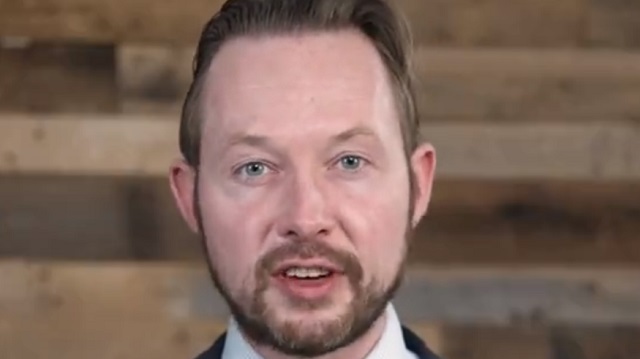MAiD
Conservative MP warns Canada to stop ‘wrong’ and ‘dangerous’ euthanasia expansion to mentally ill

MP Michael Cooper
From LifeSiteNews
On March 9, 2024, Medical Assistance in Dying is set to include those suffering solely from mental illness and MP Michael Cooper said Canadians ought to be ‘offered hope and help’ and ‘not death.’
Canada is set to go down a “very dangerous road in March of 2024” should it proceed with expanding euthanasia to the mentally ill, warned Conservative MP Michael Cooper, who urged the Liberal federal government to immediately “scrap” its “radical” assisted-suicide program and instead offer “hope” for the suffering.
“Unless the Liberals reverse course, Canada is set to go down a very dangerous road in March of 2024, when MAiD for mental illness becomes available,” Cooper said in a video posted to X (formerly Twitter) on Wednesday.
“There is something they (the federal government) can do. Canada doesn’t need to go ahead with this, what the Liberals need to do is follow the evidence, stop the madness, and introduce legislation to permanently scrap this radical expansion.”
Cooper then said Canadians who are “suffering from mental health issues” ought to be “offered hope and help” and “not death.”
On March 9, 2024, euthanasia in Canada, or Medical Assistance in Dying (MAiD) as it is known, is set to expand to include those suffering solely from mental illness. This is a result of the 2021 passage of Bill C-7, which also allowed the chronically ill – not just the terminally ill – to qualify for so-called doctor-assisted death.
The expansion comes despite warnings from top Canadian psychiatrists who said the country is “not ready” for the coming expansion of euthanasia to those who are mentally ill, adding that the procedure is not something “society should be doing” as it could lead to deaths under a “false pretense.”
Cooper noted that the law itself is ambiguous in that it leaves open the door to anyone being approved for the grim procedure.
“It is impossible to accurately predict your immediate reality under the law,” said Cooper, adding, “The leading medical professionals said that Canada isn’t ready for two fundamental reasons.”
“The first is that in order to qualify for MAiD, someone must suffer from an irremediable disease or illness, and afterwards one must suffer from a disease or illness in which they are not going to get better, and they are in an irreversible state of decline,” he noted.
Cooper observed how medical professionals have said that suffering from mental illness can’t “accurately be predicted, and so, therefore, persons who could get better, who could go on to lead healthy and happy lives, will have their lives prematurely ended.”
He then noted that a second “fundamental problem” with expanding MAiD to those with mental illness is the difficulty to “distinguish in the case of mental illness between a rational request for aid and one motivated by suicidal ideation.”
“This is underscored by the fact that the vast majority of persons who commit suicide suffer from a diagnosable mental disorder. And you might be wondering who would qualify for MAiD in mental illness? What constitutes a mental disorder for the purpose of the law?”
As it stands now, according to a task group appointed by the Liberals that was struck to establish MAiD practice “standards,” anyone would qualify “if they suffer from a mental disorder listed in” the standards guide, which includes those who are depressed, autistic, or having addictions issues.
Cooper said that the standards as written are “radical” as well as “dangerous” and “wrong.”
The mental illness expansion was originally set to take effect in March 2023. However, after massive pushback from pro-life groups, conservative politicians and others, the Liberals under Prime Minister Justin Trudeau delayed the introduction of the full effect of Bill C-7 until 2024 via Bill C-39, which becomes law next year.
The delay in expanding MAiD until 2024 also came after numerous public scandals, including the surfacing of reports that Canadian veterans were being offered the fatal procedure by workers at Veterans Affairs Canada (VAC).
When it comes to MAiD, more Canadians are dying from the procedure every year. Indeed, a recent Statistics Canada update admitted to excluding euthanasia from deaths totals despite being the sixth highest cause of mortality in the nation.
The number of Canadians killed by lethal injection since 2016 now stands at 44,958.
Stopping euthanasia expansion still possible, says pro-life advocate
Recently, LifeSiteNews reported on how pro-euthanasia lobbyists want Canada’s assisted suicide via lethal injection laws to be extended to drug addicts, which critics warn could lead the nation down a dangerous path nearing “eugenics.”
Recent attempts by the Conservative Party of Canada (CPC) to stop the expansion of MAiD have failed.
MPs in the House of Commons voted down a private members’ bill introduced by CPC MP Ed Fast that would have repealed the expansion of euthanasia laws to those suffering from mental illness.
However, according to LifeSiteNews contributor and pro-life advocate Jonathon Van Maren, Canadian Justice Minister Arif Virani noted that the “Trudeau government is considering delaying the expansion once again.”
Virani recently told The Canadian Press that the Liberal government is “weighing our options” about expanding MAiD in March while currently assessing what the joint parliamentary committee and medical experts are telling them.
“We’ll evaluate all of that comprehensively to make a decision whether we move ahead on March 17 or whether we pause,” he noted.
For respectful communication with Justice Minister Arif Virani:
Email: [email protected]
Constituency Office phone: 416-769-5072
Parliamentary Office phone: 613-992-2936
MAiD
Disability rights panel calls out Canada, US states pushing euthanasia on sick patients

From LifeSiteNews
Physician-assisted suicide programs in the US and Canada are discriminating against patients with serious medical conditions according to a panel discussion at the Religion News Association.
Physician-assisted suicide programs in the United States and Canada are discriminating against patients with serious medical conditions even when their cases are not terminal, in many cases pushing to end their lives for financial reasons rather than medical.
Catholic News Agency reported that a panel of disability-rights advocates recently examined the landscape of the issue during the Religion News Association’s 2025 annual conference. During the panel, Patients Rights Action Fund (PRAF) executive director Matt Vallière accused state euthanasia programs of discriminating against patients with life-threatening conditions in violation of the Americans with Disabilities Act, noting that when a state will “will pay for every instance of assisted suicide” but not palliative care, “I don’t call that autonomy, I call that eugenics.”
Inclusion Canada CEO Krista Carr, meanwhile, discussed her organization’s lawsuit against the expansion of Canada’s medical assistance in dying (MAID) program to “people with an incurable disease or disability who are not dying, so they’re not at end of life and their death is not reasonably foreseeable.”
More astonishingly, she added, this “funded right” to lethal injection is slated to be expanded to mental illness in 2027.
“By setting out a timeline of three years, it’s an indication that the systems need to move towards readiness in two years. There’s the opportunity to do another review, and to assess the readiness of the system through a parliamentary process,” Health Minister Mark Holland said in February of the move, which Dying with Dignity Canada presents as a matter of “equality” for “those whose sole underlying condition is a mental illness.”
“It’s being called a choice,” but “it’s not a choice,” Carr said. Rather, these programs are pushing the “choice” on patients in “a desperate situation where they can’t get the support they need.”
As LifeSiteNews recently covered, the “most recent reports show that (medical assistance in dying) is the sixth highest cause of death in Canada. However, it was not listed as such in Statistics Canada’s top 10 leading causes of death from 2019 to 2022.”
In America, nine states plus the District of Columbia currently allow assisted suicide.
Support is available to talk those struggling with suicidal thoughts out of ending their lives. The American Suicide & Crisis Lifeline and the Canadian Suicide Crisis Helpline can both be reached by calling or texting 988.
MacDonald Laurier Institute
Rushing to death in Canada’s MAiD regime

 By Ramona Coelho for Inside Policy
By Ramona Coelho for Inside Policy
Canada legalized Medical Assistance in Dying (MAiD) in 2016, encompassing both euthanasia and assisted suicide. Initially limited to those nearing their natural death, eligibility expanded in 2021 to individuals with physical disabilities, with eligibility for individuals with mental illness in 2027. Parliamentary recommendations include MAiD for children. A recent federal consultation explored extending MAiD to those who lack capacity via advance directives, an approach Quebec has already adopted, despite its criminal status under federal law.
Despite its compassionate framing, investigative journalists and government reports reveal troubling patterns where inadequate exploration of reversible suffering – such as lack of access to medical treatments, poverty, loneliness, and feelings of being a burden – have driven Canadians to choose death. As described by our former Disability Inclusion Minister, Canada’s system at times makes it easier to access MAiD than to receive basic care like a wheelchair. With over 60,000 MAiD cases by the end of 2023, the evidence raises grave concerns about Canada’s MAiD regime.
I am a member of Ontario’s MAiD Death Review Committee (MDRC). Last year, the Chief Coroner released MDRC reports, and a new set of reports has just been published. The first report released by the Office of the Chief Coroner, Waivers of Final Consent, examines how individuals in Track 1 (reasonably foreseeable natural death) can sign waivers to have their lives ended even if they lose the capacity to consent by the scheduled date of MAiD. The second, Navigating Complex Issues within Same Day and Next Day MAiD Provisions, includes cases where MAiD was provided on the same day or the day after it was requested. These reports raise questions about whether proper assessments, thorough exploration of suffering, and informed consent were consistently practised by MAiD clinicians. While MDRC members hold diverse views, here is my take.
Rushing to death, Ignoring Reversible Causes of Suffering
In the same-day or next-day MAiD report, Mrs. B, in her 80s, after complications from surgery, opted for palliative care, leading to discharge home. She later requested a MAiD assessment, but her assessor noted she preferred palliative care based on personal and religious values. The next day, her spouse, struggling with caregiver burnout, took her to the emergency department, but she was discharged home. When a request for hospice palliative care was denied, her spouse contacted the provincial MAiD coordination service for an urgent assessment. A new assessor deemed her eligible for MAiD, despite concerns from the first practitioner, who questioned the new assessor on the urgency, the sudden shift in patient perspective, and the influence of caregiver burnout. The initial assessor requested an opportunity for re-evaluation, but this was denied, with the second assessor deeming it urgent. That evening, a third MAiD practitioner was brought in, and Mrs. B underwent MAiD that night.
The focus should have been on ensuring adequate palliative care and support for Mrs. B and her spouse. Hospice and palliative care teams should have been urgently re-engaged, given the severity of the situation. Additionally, the MAiD provider expedited the process despite the first assessor’s and Mrs. B’s concerns without fully considering the impact of her spouse’s burnout.
The report also has worrying trends suggesting that local medical cultures—rather than patient choice—could be influencing rushed MAiD. Geographic clustering, particularly in Western Ontario, where same-day and next-day MAiD deaths occur most frequently, raises concerns that some MAiD providers may be predisposed to rapidly approve patients for quick death rather than ensuring patients have access to adequate care or exploring if suffering is remediable. This highlights a worrying trend where the speed of the MAiD provision is prioritized over patient-centered care and ethical safeguards.
MAiD without Free and Informed Choice
Consent has been central to Canadians’ acceptance of the legalization of euthanasia and assisted suicide. However, some cases in these reports point to concerns already raised by clinicians: the lack of thorough capacity assessments and concerns that individuals may not have freely chosen MAiD.
In the waiver of final consent report, Mr. B, a man with Alzheimer’s, had been approved for MAiD with such a waiver. However, by the scheduled provision date, his spouse reported increased confusion. Upon arrival, the MAiD provider noted that Mr. B no longer recognized them and so chose not to engage him in discussion at all. Without any verbal interaction to determine his current wishes or understanding, Mr. B’s life was ended.
In the same-day or next-day MAiD report, Mr. C, diagnosed with metastatic cancer, initially expressed interest in MAiD but then experienced cognitive decline and became delirious. He was sedated for pain management. Despite the treating team confirming that capacity was no longer present, a MAiD practitioner arrived and withheld sedation, attempting to rouse him. It was documented that the patient mouthed “yes” and nodded and blinked in response to questions. Based on this interaction, the MAiD provider deemed the patient to have capacity. The MAiD practitioner then facilitated a virtual second assessment, and MAiD was administered.
These individuals were not given genuine opportunities to confirm whether they wished to die. Instead, their past wishes or inquiries were prioritized, raising concerns about ensuring free and informed consent for MAiD. As early as 2020, the Chief Coroner of Ontario identified cases where patients received MAiD without well-documented capacity assessments, even though their medical records suggested they lacked capacity. Further, when Dr. Leonie Herx, past president of the Canadian Society of Palliative Medicine, testified before Parliament about MAiD frequently occurring without capacity, an MP dismissed her, advising Parliament to be cautious about considering seriously evidence under parliamentary immunities that amounted to malpractice allegations, which should be handled by the appropriate regulatory bodies or police. These dismissive comments stand in stark contrast with the gravity of assessing financial capacity, and yet the magnitude is greater when ending life. By way of comparison, for my father, an Ontario-approved capacity expert conducted a rigorous evaluation before declaring him incapable of managing his finances. This included a lengthy interview, collateral history, and review of financial documents—yet no such rigorous capacity assessment is mandated for MAiD.
What is Compassion?
While the federal government has finished its consultation on advance directives for MAiD, experts warn against overlooking the complexities of choosing death based on hypothetical suffering and no lived experience to inform those choices. A substitute decision-maker has to interpret prior wishes, leading to guesswork and ethical dilemmas. These cases highlight how vulnerable individuals, having lost the capacity to consent, may be coerced or unduly influenced to die—whether through financial abuse, caregiver burnout, or other pressures—reminding us that the stakes are high – life and death, no less.
The fundamental expectation of health care should be to rush to care for the patient, providing support through a system that embraces them—not rush them toward death without efforts to mitigate suffering or ensure free and informed consent. If we truly value dignity, we must invest in comprehensive care to prevent patients from being administered speedy death in their most vulnerable moment, turning their worst day into potentially their last.
Dr. Ramona Coelho is a family physician whose practice largely serves marginalised persons in London, Ontario. She is a senior fellow at the Macdonald-Laurier Institute and co-editor of the new book “Unravelling MAiD in Canada” from McGill University Press.
-

 2025 Federal Election2 days ago
2025 Federal Election2 days agoRCMP memo warns of Chinese interference on Canadian university campuses to affect election
-

 2025 Federal Election1 day ago
2025 Federal Election1 day agoResearchers Link China’s Intelligence and Elite Influence Arms to B.C. Government, Liberal Party, and Trudeau-Appointed Senator
-

 COVID-191 day ago
COVID-191 day agoFauci, top COVID officials have criminal referral requests filed against them in 7 states
-

 COVID-1917 hours ago
COVID-1917 hours agoCDC Vaccine Safety Director May Have Destroyed Records, Says Sen. Ron Johnson
-

 Daily Caller6 hours ago
Daily Caller6 hours agoAI Needs Natural Gas To Survive
-

 Business2 days ago
Business2 days agoScott Bessent Says Trump’s Goal Was Always To Get Trading Partners To Table After Major Pause Announcement
-

 International1 day ago
International1 day agoTrump White House will ignore reporter emails that include ‘preferred pronouns’ in signature
-

 COVID-192 days ago
COVID-192 days agoBiden Admin concealed report on earliest COVID cases from 2019









